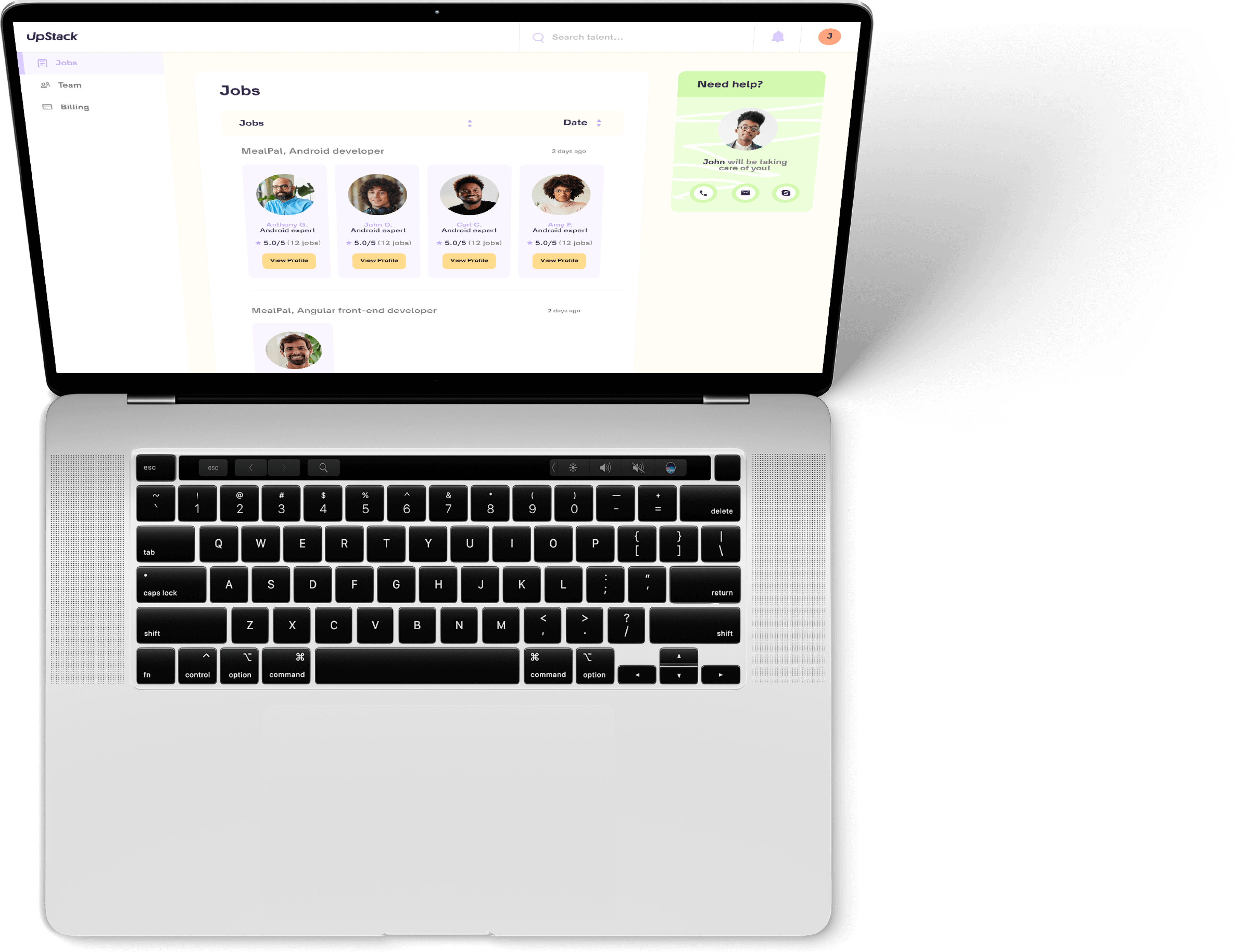


Schedule a consultation and Hire a PHP Developer
Stella B.
Available
Java Developer
-
Experienced PHP engineer with seamless project implementation
-
Loves guacamole & hates spoilers

-
Marcus T.
Available
Python Engineer
-
Stacked portfolio of beautiful, functional websites
-
Known for his epic charcuterie & cheese boards

-
David M.
Available
Mobile Developer
-
Mobile engineering guru with a knack for translating stakeholder needs
-
Would rather be diving Palau’s Blue Corner

-
Top UpStack PHP Developers
Hire PHP Developers with Upstack
Did you know that PHP powers almost 25% of all websites? It’s no wonder that companies are hiring PHP developers left and right. With the demand for this skill continuing to grow, now is the perfect time to hire a PHP developer. If you’re ready to find your next great hire, read on. In this section, we’ll walk you through Upstack’s hiring process and how it can support your team as you search for your next perfect PHP candidate. As an engineer with UpStack, my job involves solving complex problems in meetings with teammates every day. As someone who has conducted hundreds of technical interviews, I understand exactly how important the hiring process is — not just for the company but also for the potential employee.
The Importance of the Hiring Process
The hiring process is incredibly important for all parties involved. Every candidate deserves to be treated appropriately and receive fair treatment throughout the process, and UpStack makes sure everyone is setup to succeed. The hiring process is also critical for a company’s bottom line. A bad hire can be a huge drain on resources, time, and money. Poorly selected PHP candidates can also damage team morale, leading to a high turnover rate and other issues. A well-executed hire can help make sure you only hire high-quality candidates, which will save your business time and money down the road. It’s also a great way to make sure your company culture is representative of what you want it to be.
How to Find a PHP Programmer
If you’ve decided to hire a PHP programmer, your first step should be to find the right candidates. Finding the right candidates is critical to ensuring that you end up with a great hire — and it’s often the most difficult part of the hiring process. UpStack will guide you through the way for the entire hiring process. Finding the right PHP programmer is sometimes a tricky task. You want to find someone who has the right skills and experience, as well as someone who is motivated and excited about working for your company. To make sure you find the right candidate, we will set up multiple interviews if necessary until you find the PHP developer who is perfect for your team.
Upstack’s Hiring Process
Once you’ve found your ideal candidates, it’s time to bring them in for a virtual interview. A technical interview can be challenging for both the hiring manager and the candidate. This is why it’s important to have a consistent process in place. You might have heard that you should only spend 30 minutes interviewing each candidate, but that can be difficult if you’re interviewing multiple programmers at once. Instead, you should have a consistent process in place that allows you to give each candidate the attention they need. At Upstack, we recommend a hiring process that includes the following steps: - Create a job description - Interview candidates - Conduct code reviews - Bring candidates in for virtual interviews - Make an offer.
How to Streamline Your Recruiting Process with Upstack
Hiring is one of the most important parts of running a business, but it can also be one of the most difficult parts. It’s often difficult to find the right employees and to bring them on board. If you’re looking for new PHP developers, you can make the process easier by using UpStack. UpStack will help you manage the hiring process, and make sure you’re following company guidelines, and help you find new candidates faster.
In Summary
Finding the right PHP programmer for your team can seem like an insurmountable task, but it doesn’t have to be that way. By using UpStack and our 1 on 1 support, you’ll be able to better prepare for your hiring process and find the right candidates for your team. When hiring for a new position, it’s important to look for a candidate who is also a good cultural fit for your team. This means that you should seek out candidates who are working towards similar goals as your team, who are motivated, and who are excited to work together and achieve those goals. When you find the right PHP coder, you can help them feel welcome and excited about the opportunity by following a few simple hiring tips. You can offer a clear and concise explanation of the job, a virtual tour of the office and the team, and information about company culture and benefits. This will help you hire the best candidates, while also making your candidates feel excited and eager to join the team.
They Trust our PHP Developers
Why hire a PHP developer with Upstack
![PHP Developer and Programmer Icon]()
Top PHP talent pre-vetted for a perfect fit.
Our 8-point assessment evaluation ensures that every senior PHP developer you interview exceeds expectations across technical, cultural, and language criteria.
![PHP Programmers Computer Icon]()
Hire reliable, passionate PHP developers.
From late-night sprints to jumping on a last-minute face-to-face, we ensure that your recruits are down to get the job done right.
![PHP Programmers High Five Icon]()
Risk-free 14-day trial.
Confidently onboard candidates with our no-questions-asked trial period. We’ll walk you through the contract-to-hire process if and when you’re ready to make it permanent with your new PHP engineer.
![PHP Computer Programmer Icon]()
Our Client Success Experts provide white-glove service.
Stay laser-focused on your business goals while our team of experts curates potential candidates and manages seamless programmer onboarding.
![PHP Developer Writing Notes Icon]()
Build your optimal team confidently, quickly.
UpStack handles everything including background and reference checks, legal issues, and more. Our platform streamlines billing, timesheets, and payment all in one easy-to-access place.
Schedule a call with a Client Success Expert to get starting hiring a PHP developer.
Start hiring Start hiring Start hiring
Hire from the Best.
Working with our Client Success Experts, we’ll help you build the remote team of your dreams with top PHP talent from around the world.
Pre-vetted, reliable PHP developers are standing by. Learn more about us and why UpStack is the perfect toptal alternative.





FAQ About Hiring A PHP Developer
How much does it cost to hire a PHP developer?
UpStack has a simple billing model where each PHP programmer has a standard hourly rate averaging between $65-$75 per hour. Rates are based on skills, knowledge, and experience, and our engineers are available mainly for full-time engagement (40 hours per week) and the occasional part-time opportunity (20 hours per week).
What is the process to find a PHP developer?
You’ll connect with an UpStack Client Success Manager to determine your immediate needs. Our team uses a combination of AI and personal assessment to short-list candidates that match your job requirements. From there, you interview, select, and onboard the perfect developer, all within days of your initial call.
How does UpStack find its PHP developers?
UpStack’s talent recruitment team connects with software developers around the globe every day. Each PHP programmer is vetted for technical, communication, and other soft skills necessary for a developer to successfully work with your team. Once vetted, the candidates are accepted into the UpStack developer community.
How is UpStack different from an agency or recruiter?
UpStack's community of available, pre-vetted engineering talent means minimizing roadblocks to scaling your team effectively, efficiently, and immediately. Our Client Success Experts work with you and your UpStack developer to ensure a smooth and seamless engagement.
Can I hire UpStack PHP developers directly?
Yes, you can hire UpStack PHP developers at any time, and with the same assurance of smoothly on boarding talent risk-free. First, we’d create a job opening on our portal. Then, we’d vet, interview, and match developers that meet your needs. If you’re satisfied at the end of the 14-day trial period, at any time you can directly hire them.
Additional PHP Information
What makes a good PHP Coder?
PHP is a server language broadly used in static and dynamic websites and web applications. Creating web pages in PHP is straightforward and might not require too much stress; Therefore, it is easy to develop working code in a few hours. However, being easy makes it a language that has much criticism. Regardless of qualification level, PHP developers make a lot of mistakes when coding. Web development mistakes can cause a lot of damage and increase a website's bounce rate. Here are key mistakes our PHP programmers look out for when coding.
Use of Quotation Marks
Generally, you would utilize double quotes when concatenating strings because everything is parsed cleanly without a need to work with escape characters and dot values. However, using single quotation marks has a significant performance advantage because much processing is not required.
Check this string:
- # $singlequo = 'everyone';
- # $str1 = 'hello $singlequo';
- # $str2 = "hello $singlequo";
$str2 prints "hello $singlequo" and $srt1 prints "Hello everyone". This is one less step for PHP processing. It's a slight change, but it can greatly improve code performance.
Database cache is NOT used
If there is a database in your PHP app, it is highly recommended that you use at least some form of database caching. Memcached has grown to become the largest caching system, with big websites like Facebook supporting the software. Memcached is free and can bring significant benefits to your software. If your PHP is being produced, it is highly recommended that you use the caching system.
When E_ALL reporting is not being used
Error reporting is a very convenient feature in PHP, and if you haven't used it yet, you should really enable it. Error reporting eliminates many code troubleshooting assumptions and speeds up your overall development time. Although many PHP programmers use error reporting, many people do not take advantage of the entire field of error reporting. E_ALL is a very strict error reporting method; using it, you can ensure that the slightest error is reported. After you finish developing the program, be sure to close the report because your users may not want to see any error messages on a page that looks good.
No time limit for PHP scripts
When running PHP scripts, they are expected to be completed to the end timely. However, any experienced programmer knows that nothing should be assumed while writing code. Nothing makes a program quirky than an unresponsive script. You can solve this problem just by setting the timeout (set_time_limit) in the script. While this may seem like a difficult thing to do, it is always wise to prepare for the worst.
Don't Forget to Remove Development Configurations
It is essential that a developer has a working (development) environment- a staging environment that is able to imitate the production environment in which the code is located. In some cases, developers may be tempted to forget to delete variables and development sites and unintentionally load them into the production environment. This is a disaster for real-time applications.
Most developers (especially new ones) do not always want to go through the staging environment and go directly from development to production to save time. This is an error because staging can help you identify issues you didn't notice during the development process (remember, staging simulates production). If you forget to delete the configuration or don't find any errors before staging, you can still intercept them before they are put into production. Having and using a staging environment is important, even if you make the smallest changes. It is also great if QA testers test the code before releasing it to production.
Forgetting to Run Backups
This might seem easy; however, a lot of developers do not have a proper backup system. You don't have to back up every hour, but if you're working significantly on a project, you should back up every day. Remember, if your drive fails and you lose data, your backup can sometimes save you from starting over. If you do not find the problem in the code, make a backup of the system so that you do not lose the solution, your efforts, and also re-coding again. If something goes wrong, a backup can prevent you from missing the deadline. It would be best if you also backed up your clients because clients might have issues and have no backup. It's a nice thing and can help your client get out of a potentially sensitive situation.
Too many indexes or not enough indexes
When querying large tables with large amounts of data, indexes can greatly improve performance. You can speed up SELECT query statements with the help of database indexes. There are applications of indexes to columns named in the WHERE clause of the SELECT query, and MySQL uses fast search algorithms to find data. You can be tempted to add indexes to all columns; however, it's important to note that they are regenerated after every INSERT and UPDATE query. The amount of index is dependent on data usage and application. Developers need to look at slow query logs and usage patterns to balance them for better results.
Avoid error suppressing
Unless it poses a threat, you should not try to suppress errors in the code manually. For instance, you can suppress PHP version warning messages. By suppressing errors more frequently, applications can run under potentially error conditions. When using the php.ini file, you are advised to redirect it to the error log. A PHP plugin (such as Papertrail) does not make the error appear on the screen but sends errors to the server-side so that they can be found, grouped, and fixed later. It is better to deal with errors than to suppress them.
Top PHP Tools Our Developers Use
One of the fastest and popularly used server-side scripting languages for creating different websites and web applications is the Hypertext Preprocessor (PHP). There are several reasons why some PHP developers use it more than other server-side languages, such as Python and Ruby. PHP comes with detailed documentation, lots of pre-made scripts, a large community, and a highly supported framework. To simplify the process of using PHP, experts have created several PHP development tools to make programming more efficient. The PHP tool aims to provide the perfect IDE (Integrated Development Environment) in which PHP developers can efficiently create attractive, innovative, and good PHP projects. Besides, unlike other frameworks that do not have adequate documentation and public support, PHP provides all of this and offers excellent frameworks, ready-to-use scripting, and a large number. With all these benefits aside, PHP is the starting point for any amateur or person with a little technical knowledge.
Below are some of the best PHP tools that are commonly used all over the world.
Eclipse
Eclipse is coming first as it's one of the most used tools for PHP development. Because it is a completely developed tool, it is the most commonly utilized IDE (integrated development environment) that provides PHP. The great thing about this tool is that it supports some of the most widely used operating systems, including Windows, macOS, and Linux. Several of the tools offered by Eclipse make it simpler to develop and simplify complex PHP applications. Using Eclipse, you have the freedom to choose from a wide variety of plugins. It also supports GUI applications and non-GUI applications. Eclipse as a PHP tool enables users to use some specific plugins that can be used to extend the IDE and adapt it to the project's requirements.
Aptana Studio
Aptana Studio is an open-source PHP tool that can be used in combination with many clients and server-side web technologies. Several of these technologies include PHP, Python, CSS3, Ruby on Rails, Ruby, and HTML5. It works with debuggers and a command-line interface to simplify the development of PHP applications. It enables PHP programmers to create and test web applications in a single environment. It features SFTP, FTP, and IDE settings. This powerful web development engine takes advantage of the flexibility of Eclipse and contains details about the level of support for each element in leading web browsers. Aptana Studio is a powerful PHP IDE and has a multitude of attractive functions to enhance your productivity.
Sublime Text
Sublime Text is a multifunctional text editor that features a custom User Interface toolkit. The excellent text editor is created to help you write code, markup, and prose using a powerful built-in command-line palette. The platform provides various shortcuts for developers, allowing them to quickly browse files, jump to lines, words, or icons. Using Sublime, developers can edit or change multiple codes simultaneously. The platform is compatible with several language grammars and allows developers to edit at the same time. Sublime is one of the most widely used text editors for PHP developers; it can be faster and straightforward to use.
Code Lobster
If you are looking for a portable IDE, then Code Lobster is a perfect choice. It provides powerful support for several popular PHP frameworks and even CMS. The best CMS frameworks include CakePHP, Drupal, Joomla, Symfony, CodeIgniter, WordPress, and Magento. Using Code Lobster, programmers can now use PHP to write custom web applications and include valuable features like auto-completion, syntax highlighting, debugger, SQL manager, code validator, etc. PHP coders can now use various advanced features when they upgrade to the professional version.
NuSphere
Here is another company that develops the best PHP tools to enhance the web development experience, and the IDE they create is the PHPED. It supports the latest version of the PHP editor, which supports PHP 7 and many other old and new PHP frameworks, including Laravel, Yii, and Symfony, and almost any content management system (CMS), such as WordPress and Joomla. What is new in the latest version is performing unit tests for local and remote projects. In short, NuSphere PHPED IDE is a package web development tool that supports JavaScript debugging, CSS preprocessing with the LESS preprocessor, HTML5, and anything else in PHP.
Zend Studio
Zend Studio has become many people’s favorite PHP tool because of its unparalleled speed compared to other PHP development tools. With Zend Studio, programmers and developers can take advantage of the flexibility to write and debug code without spending extra time or effort to achieve this goal. Using Zend Studio, it is easy for developers to organize PHP applications across multiple servers. Zend Studio is designed to support PHP 7. It is also possible to debug code in integration with Zend Debuggers, X-Debug, and X-Ray. In addition, there is the possibility of integration using Eclipse plugins for the Zend Studio extension.
NetBeans
This is also an open-source IDE that supports many programming languages, part of which is PHP. The downloading is free and is an open-source platform with the largest developer community. The software is written in Java and supports different web and CMS frameworks, such as WordPress, CakePHP, Symfony, and Zend. The NetBeans user interface is based on Swift (Java lightweight toolkit), making the user interface easier to use. Earlier versions of this IDE were slower and only worked with Java. However, with multiple language support and various other features, the speed and performance have been enhanced.
AWS Cloud 9
If you are working in the cloud, you can always choose this IDE because it can help developers simplify the development of applications using PHP. AWS Cloud 9 provides greater freedom to use different popular network technologies, including PHP. Writing, debugging, executing, and running PHP code on any web browser becomes possible for programmers. AWS Cloud 9 is a PHP development tool that allows you to write non-server-based web applications using PHP. You can also take advantage of AWS Cloud 9 for cloud-based PHP development because it provides various functions, like code completion, debugging, and code hints.














